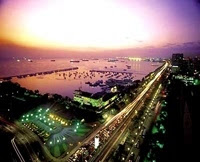MANILA, Philippines - They’re not coming in just for the beaches; they’re also here for some crash course in English.
Korea, the Philippines’ largest single source of tourists, is now bringing in droves not just holidaymakers but also students who wish to learn the English language.
Students account for 15-17 percent of Korean tourists in the Philippines, according to the Philippine tourism attaché in Seoul, Maricon Basco-Ebron. As of April, 14,400 Korean visitors have arrived here to enroll in language institutions or universities around the country.
“They like the Philippines because everybody speaks English. It’s easier to learn; they get to practice everywhere,” Ebron, who also heads the Department of Team’s Team Korea, said at the recent Korea Student Fair held in Seoul, a biannual event that brings together schools all over the world to attract students who wish to study abroad. The event draws in over 500 exhibitors from the United States, Canada, Australia, Europe and neighboring Asian countries.
Cheaper cost
While the Philippines is not a native English-speaking country, the cheaper cost of English-based education here is a major come-on to Koreans, Ebron said.“Sending a child to the US for one year is equivalent to sending a child for two years in the Philippines—plus the mom,” referring to the fact that Korean parents could easily come to the country to check on their children and enjoy the sights as well.
Hyunsook Oh, who works with the Philippine tourism office in Seoul, estimated the cost of Korean university education at $4,000 per semester, or roughly four times the tuition for the same period in a major university in Metro Manila.
She added: “The Philippines is relatively cheaper than the US, Canada or England. And it’s only 3½ hours away so parents can visit anytime. If they send the child to the US, the parents have to plan their visit.”
Most Koreans enroll in “short-term” or two-month English as a Second Language (ESL) course or study for the TOEFL (Test of English as a Foreign Language) here as preparation for further education in another country.
Younger students come in for language camps, typically two-month courses during their summer or winter break. (Philippine travel agents also offer golf and dive camps, where young Korean athletes learn the sports’ lingo in English before they compete abroad.)
source: http://showbizandstyle.inquirer.net/











































































